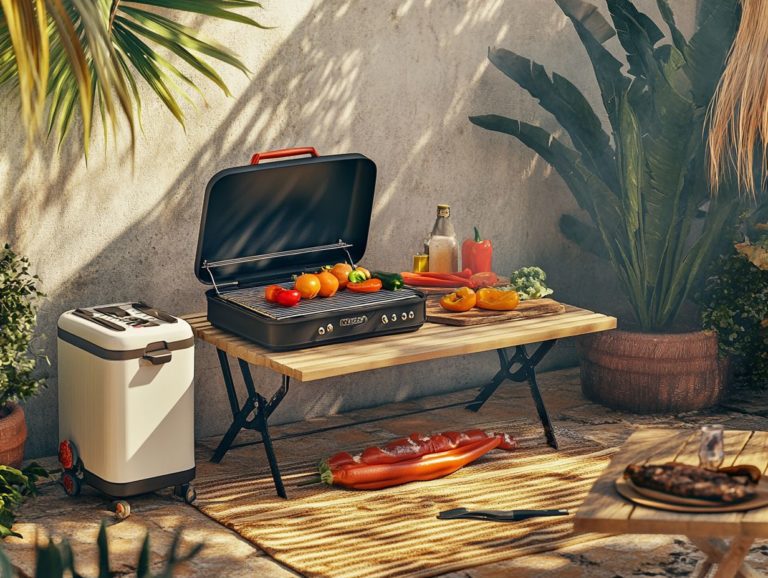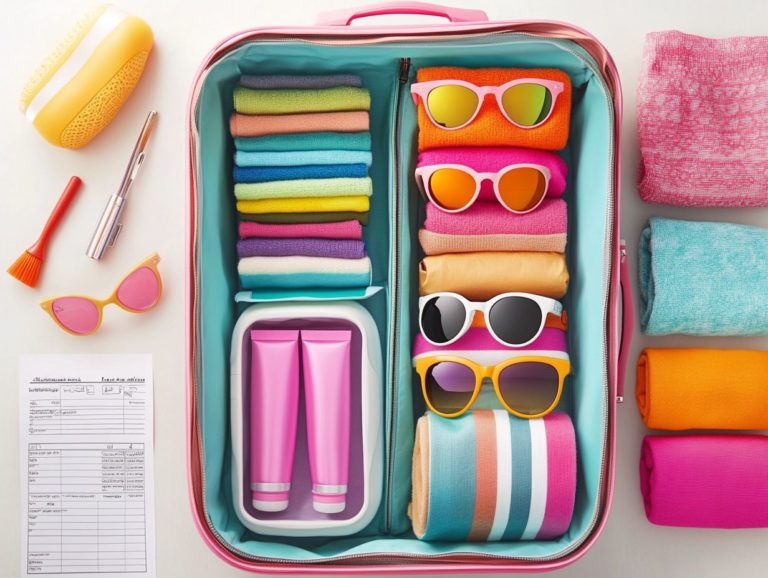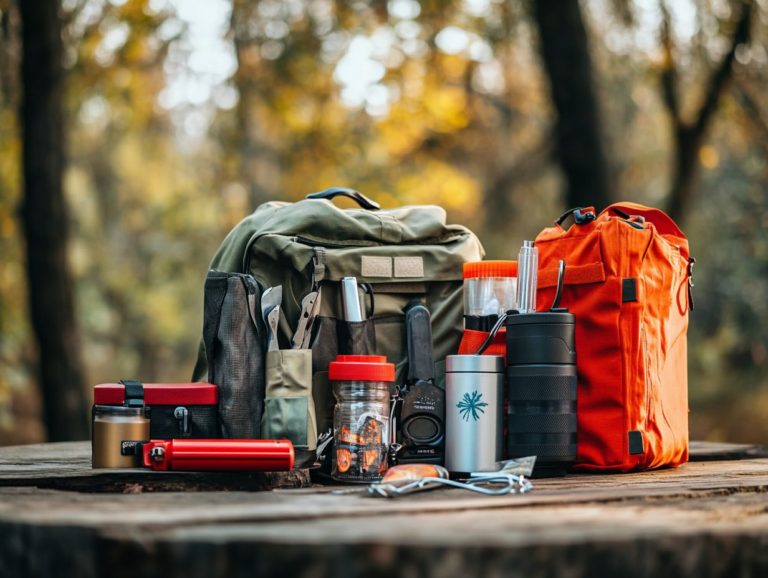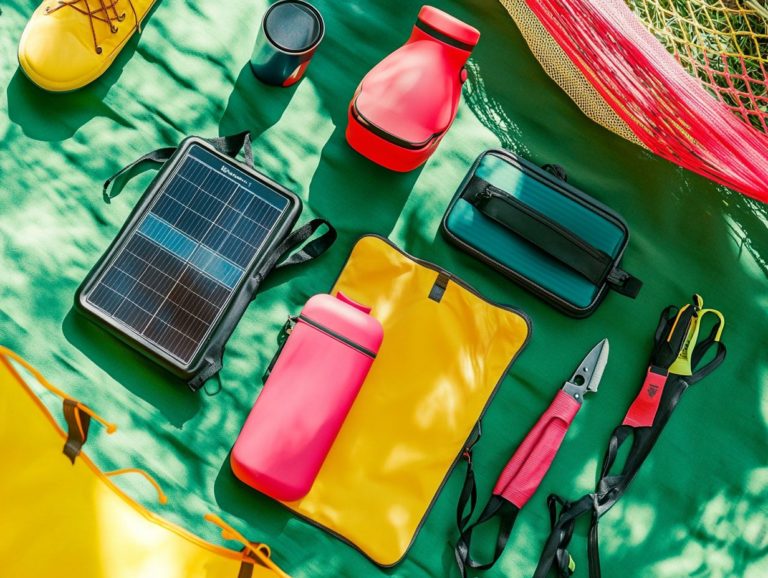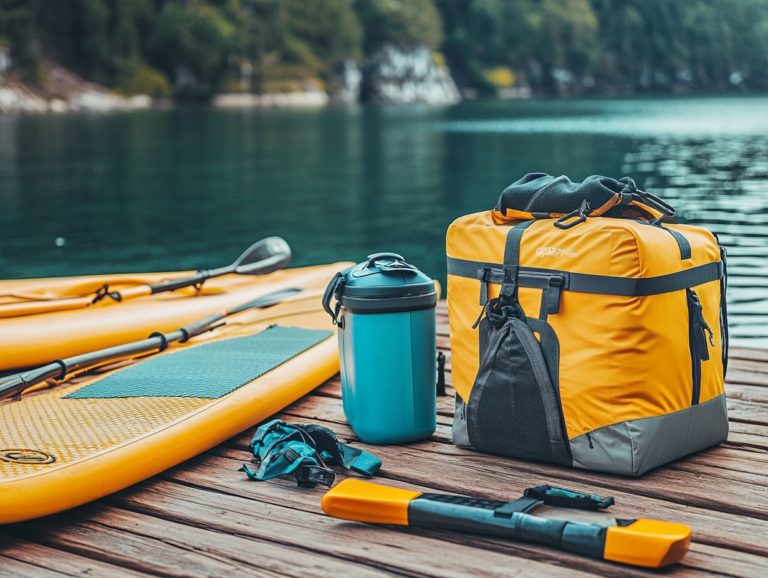Top 10 Accessories for Backpacking Trips
Planning a backpacking trip? Ensuring you have the right gear is crucial it can turn a challenging experience into a memorable adventure.
Explore the top 10 must-have accessories every backpacker should consider. From lightweight tents and durable backpacks to portable stoves, each item serves a vital purpose in enhancing your journey.
Get ready to uncover essential tips on selecting the best gear, minimizing weight, and staying prepared with key hiking essentials for any surprises that may come your way. Get ready to hit the trails with confidence and relish every moment of your adventure!
Contents
- Key Takeaways:
- Top 10 Accessories for Backpacking Trips
- 1. Lightweight Backpack
- 2. Sleeping Bag and Sleeping Pad
- 3. Tent
- 4. Water Purifier
- 5. Portable Stove
- 6. Headlamp
- 7. Multi-Tool
- 8. First Aid Kit
- 9. Hiking Boots
- 10. Quick-Dry Towel
- What Factors Should Be Considered When Choosing Backpacking Accessories?
- Frequently Asked Questions
- What are the top 10 must-have accessories for a backpacking trip?
- Why is a backpacking backpack considered an essential accessory?
- What should I consider when choosing a lightweight tent for a backpacking trip?
- How important is a sleeping bag for a backpacking trip?
- What is the benefit of bringing a portable stove on a backpacking trip?
- Do I really need a water filtration system for my backpacking trip?
- Why is a first aid kit important for a backpacking trip, along with other hiking essentials?
Key Takeaways:
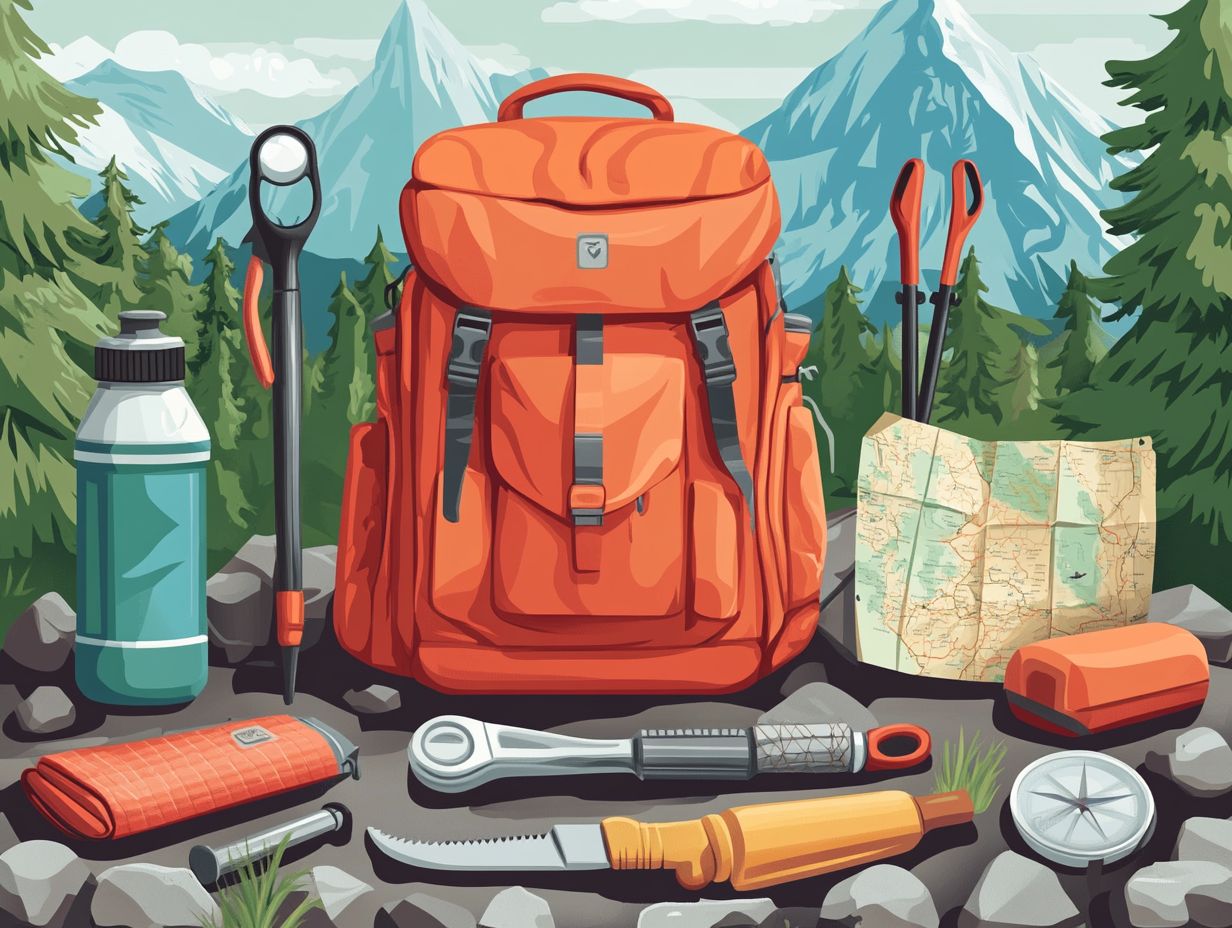
- Invest in a lightweight backpack to minimize strain on your back and shoulders while hiking.
- Bring a water filter to ensure clean drinking water during your trip.
- Don t forget to pack essential items like a first aid kit, multi-tool, and quick-dry towel for a safe and comfortable backpacking experience.
Top 10 Accessories for Backpacking Trips
When you’re planning an unforgettable backpacking trip, having the right accessories can truly transform your experience from a challenging ordeal into a delightful adventure. Consider reliable GPS devices, which help you navigate by providing your exact location, like the Garmin inReach, and a sturdy Osprey backpack. Selecting the best gear is essential for both your safety and enjoyment.
Lightweight gear and hiking essentials will ensure you’re well-equipped for whatever nature throws your way, whether it’s rain or a chill in the air. Plus, an REI membership grants you access to vital hiking clothes and accessories, elevating your outdoor escapade.
Every accessory plays a key role in your journey. Take the Garmin inReach Mini 2, for example not only does it guide you through uncharted territory, but it also keeps you connected in emergencies, ensuring you’re never truly off the grid.
Then there’s the Osprey backpack, engineered for ergonomic support and ample storage. It allows you to carry your essentials comfortably, making those long treks feel like a breeze.
Don t overlook the Sawyer Squeeze Water Filter System. This lightweight purification tool transforms natural water sources into safe hydration, so you can quench your thirst without worrying about contamination.
By prioritizing lightweight gear, you ll minimize fatigue and maximize your energy for exploration, letting you soak in those breathtaking landscapes. This careful selection of equipment paves the way for a truly memorable and successful outdoor experience.
1. Lightweight Backpack
Including Options Like the Osprey Hikelite 26 and Arc Zip Ultra 62L Backpack
A lightweight backpack is an essential item in your backpacking gear. It allows you to transport your belongings effortlessly without putting unnecessary strain on your back and shoulders.
When you weigh options like the Osprey Hikelite 26 and the Arc Zip Ultra 62L Backpack, the advantages become clear. Both packs feature adjustable straps and ventilated back panels, enhancing your comfort and promoting airflow during those long hikes, especially when paired with Darn Tough Hiker Micro Crew Cushion Socks.
Durability is another key factor, with materials crafted to withstand rugged terrain and unpredictable weather. Choosing the right size can significantly enhance your comfort by enabling better weight distribution and easier access to your essentials, making trekking poles a great addition for stability.
Ultimately, opting for these thoughtfully designed backpacks, like the Osprey Stratos 34, transforms your outdoor adventures. It makes them not only more enjoyable but also less taxing on your body.
2. Sleeping Bag and Sleeping Pad
Including Options Like the Therm-a-Rest NeoAir XTherm NXT
A high-quality sleeping bag and sleeping pad are essential for a restful night’s sleep while backpacking. They provide comfort and insulation against the cold ground.
Selecting the right gear can enhance your overall experience, especially in varying climates. For those seeking lightweight options, there are several types of sleeping bags, including down-filled and synthetic varieties, each with distinct advantages.
Down sleeping bags are often more packable and deliver exceptional warmth for their weight, but they can struggle when wet. In contrast, synthetic bags maintain their insulating properties even in damp conditions.
Check the temperature ratings to find the best sleeping bag for your adventures. Staying warm is key on chilly nights. Pair your sleeping bag with a carefully selected sleeping pad, like the Therm-a-Rest NeoAir XTherm NXT, available in various materials and thicknesses. This combination provides the cushioning and insulation needed from the cold ground, enhancing your comfort on the trail.
3. Tent
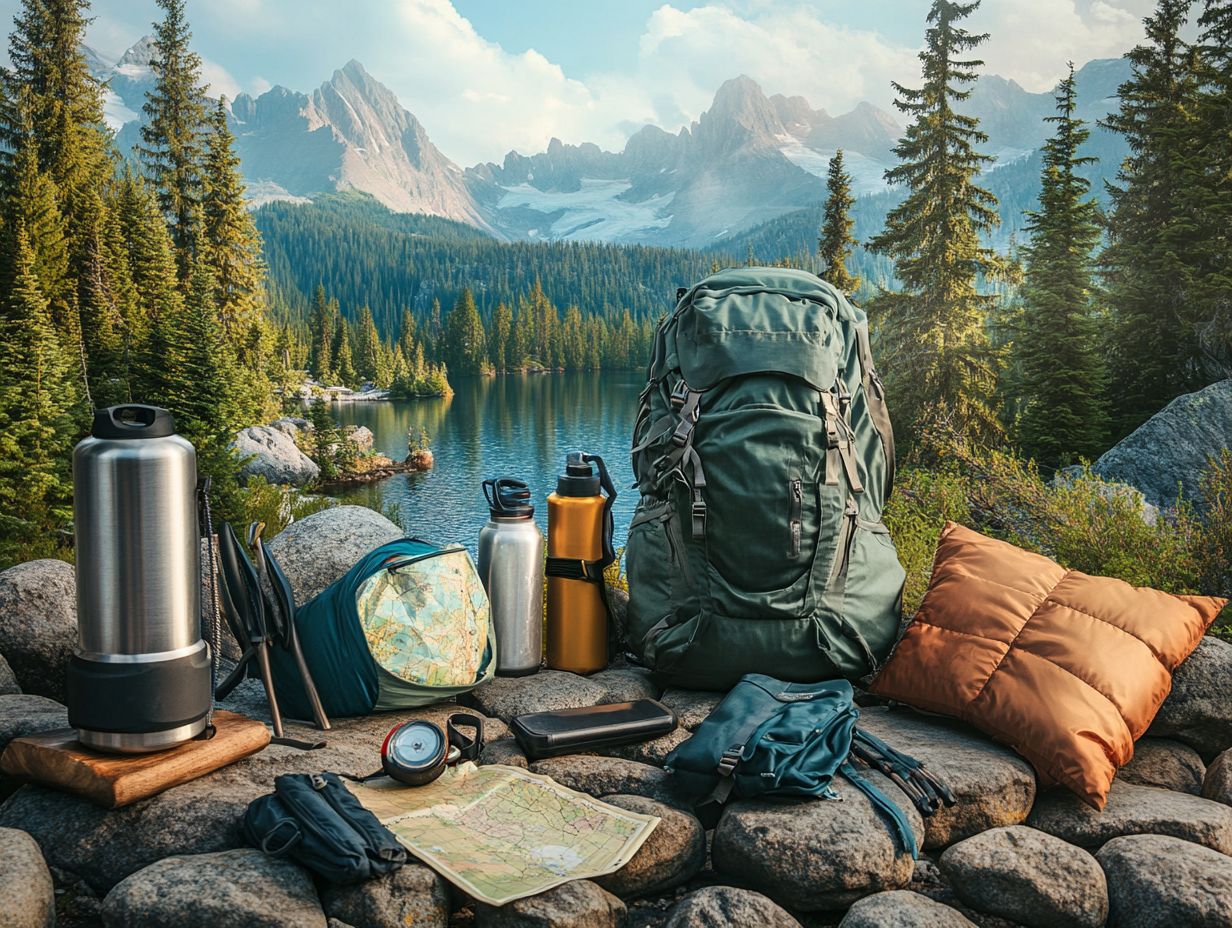
A lightweight tent is essential for your backpacking journey. It provides shelter without adding excess weight to your gear.
This vital piece of equipment simplifies carrying your belongings and offers protection against nature’s unpredictability, especially when paired with rain gear.
When selecting the right tent, consider features such as reinforced seams and weather-resistant materials for durability in challenging conditions. A quality backpacking tent can also be part of your emergency kit, offering quick refuge when the weather changes unexpectedly.
Whether shielding you from rain or keeping you warm on chilly nights, a dependable lightweight option enhances your comfort and safety during outdoor adventures.
4. Water Purifier
Access to clean water is crucial during backpacking adventures. A reliable water purifier, like the Sawyer Squeeze Water Filter System, should be at the top of your packing list.
This innovative system uses a special filter that keeps out dirt and germs, ensuring that water from streams and lakes is safe to drink. You’ll appreciate its lightweight design and user-friendly operation: fill a pouch, attach it to the filter, and give it a squeeze to purify your water.
Consider pairing it with hydration tablets to enhance the taste and add essential minerals. This versatile approach helps you stay hydrated without sacrificing quality, especially in remote areas.
5. Portable Stove
Imagine whipping up a hot meal with the MSR PocketRocket Deluxe Stove it makes hiking so much better! This stove is an essential addition to your gear, making food preparation convenient.
These stoves are both efficient and convenient, allowing you to prepare various meals right on the trail. Picture enjoying a warm bowl of oatmeal in the morning or savoring a hearty soup after a long day of trekking.
To maximize your cooking capability, choosing the right food storage options is key. Vacuum-sealed packs of dehydrated meals are lightweight and simple to prepare, perfect for your adventures, especially when paired with energy-rich hiking snacks.
Don’t forget about energy-rich hiking snacks like trail mix, energy bars, and jerky. These snacks provide the necessary fuel to keep your pace on longer hikes, ensuring you remain energized and satisfied as you enjoy the beauty of the outdoors.
Gear up and hit the trail!
6. Headlamp
A reliable headlamp, like the Nitecore NU25, is essential for walking on dark paths and setting up camp after sunset. It ensures you can see clearly while using apps on your phone that help you find your way. This crucial gear not only lights your path but also enhances your safety by helping you avoid trips and falls when visibility is low.
Brightness is key; a well-lit area can make all the difference in spotting obstacles along your way. Look for a headlamp with a long battery life, allowing it to last multiple nights without needing a recharge. This feature is vital when you’re far from electrical sources.
Lightweight designs are important too. A headlamp that won t weigh down your pack makes for easier hiking and more enjoyable adventures. In the world of hiking essentials, a quality headlamp should be on every backpacker’s gear list, alongside their Patagonia Nano Puff Jacket. Don’t head out without ensuring you have a reliable headlamp!
7. Multi-Tool
A multi-tool is a versatile accessory that serves many functions, from repairing gear to preparing food. It s an essential part of any backpacking emergency kit for unexpected moments.
Its compact design allows you to carry vital tools without adding unnecessary weight to your pack. In critical moments when time and resources are limited, having a reliable multi-tool can mean the difference between a minor inconvenience and a serious crisis. Pair it with Black Diamond Alpine Carbon Cork Trekking Poles for extra support.
Renowned brands like Leatherman and Gerber offer models equipped with features such as pliers, knives, and even can openers. These are truly invaluable during your outdoor adventures and are an integral part of your hiking gear. Many tools come with built-in safety mechanisms, ensuring they re easy to handle even in challenging conditions. This enhances your overall safety and enjoyment of your backpacking experience.
8. First Aid Kit
A well-stocked first aid kit could save your adventure! It s essential for addressing injuries or emergencies that may arise during your backpacking trip, providing peace of mind while enjoying the outdoors.
Essential items to include are:
- Adhesive bandages for covering cuts.
- Antiseptic wipes for cleaning wounds.
- Gauze pads for dressing larger injuries.
- Medical tape for securing dressings.
These items help manage minor cuts and scrapes. Don’t forget to add blister treatments, pain relievers, and allergy medications to your kit these can alleviate discomfort and prevent complications. By keeping these essentials handy, you’re ready to tackle unforeseen challenges, allowing you to embrace your outdoor experience with greater peace of mind.
9. Hiking Boots
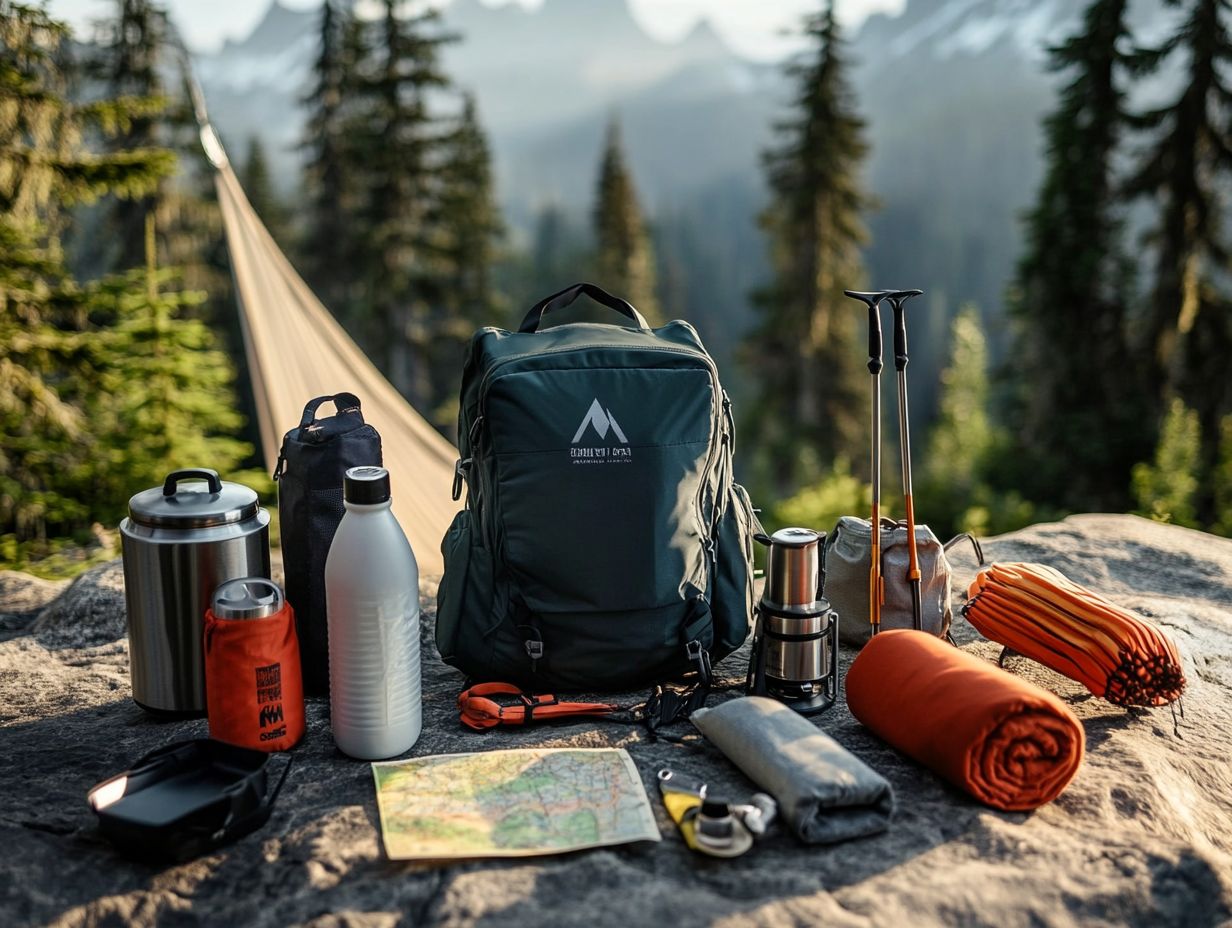
Investing in a solid pair of hiking boots is vital for ensuring your comfort and support during long trails. These boots provide the stability you need on rugged terrains while protecting your feet from hazards like sharp rocks and slippery surfaces.
When selecting your ideal footwear, consider key features such as:
- Waterproof materials for unexpected wet conditions.
- Breathable fabrics for warm weather excursions.
- Adequate traction to navigate rocky or muddy paths with ease.
The right footwear pairs beautifully with suitable hiking clothes, like moisture-wicking socks and breathable layers, enhancing your comfort and performance. Discovering the perfect combination allows you to enjoy every hike to its fullest, no matter the environment!
10. Quick-Dry Towel
A quick-dry towel is an often-overlooked essential that can greatly enhance your packing list, especially after a refreshing dip in a lake.
Not only does it absorb water efficiently, but its lightweight and compact design makes it easy to carry on any outdoor adventure. This means you can free up valuable space in your backpack for other crucial items, allowing you to travel lighter without sacrificing comfort. The quick-dry feature lets you pack it away shortly after use, sparing your gear from any unwanted damp odors.
By incorporating this versatile accessory into your outdoor kit, you elevate your backpacking experience, adding practicality and ease as you embrace the great outdoors.
What Factors Should Be Considered When Choosing Backpacking Accessories?
When selecting the right backpacking accessories, consider factors like weight, functionality, and durability. Each item must align perfectly with your hiking essentials and overall adventure needs.
The weight of your gear significantly impacts your comfort on long trails; an excessive load can lead to fatigue and discomfort. Think about how different items perform in various weather conditions. For example, waterproof bags are essential for wet environments, while breathable materials keep you comfortable in warmer climates.
Compatibility with different terrains is crucial as well; rugged landscapes may demand specialized tools. Packing a comprehensive emergency kit will give you peace of mind. Utilizing smartphone navigation tools, which are apps on your phone that help you find your way, can elevate your safety and route management, ensuring a more enjoyable hiking experience.
How Can One Minimize the Weight and Size of Their Backpacking Gear?
Minimizing the weight and size of your backpacking gear is essential for enhancing your mobility and comfort on the trail. This allows you to fully savor your adventure without the burden of excess weight.
Carefully consider your gear choices. Opt for a durable yet lightweight backpack that can endure the rigors of the outdoors while offering ample storage. It’s equally important to select efficient food storage solutions that simplify meal prep and minimize bulk. Additionally, equip yourself with the top 10 hiking safety gadgets to enhance your outdoor experience.
When packing, prioritize essential items, such as versatile clothing, a reliable shelter, and a compact cooking system. By making smart choices like utilizing multi-functional tools and lightweight materials, you can significantly lighten your load. Don’t forget to include top hiking gear accessories for a more enjoyable and effortless trekking experience.
What Are the Essential Items for a Safe and Comfortable Backpacking Trip?
To ensure a safe and enjoyable backpacking trip, pack essential items like:
- Emergency kit
- Hydration solutions
- Navigation tools
These tools enhance your overall experience and serve as critical safeguards against unexpected challenges. Imagine having an emergency kit that could be a lifesaver! It should be filled with bandages, a whistle, and a multi-tool, all ready to prepare you for whatever nature throws your way.
Hydration tablets? Absolutely critical! They help replenish minerals that keep your body balanced on those long treks, keeping fatigue and dehydration at bay. Let s not forget about navigation; having a reliable map or a smartphone loaded with navigation apps gives you the peace of mind to explore new trails without the fear of getting lost.
When you gather these essentials, you create a sense of security and comfort that allows you to fully immerse yourself in the breathtaking beauty of nature. Don t wait start planning your adventure today with the right gear!
What Are Some Useful Tips for Packing and Organizing Backpacking Gear?
Effective packing and organization of your backpacking gear can truly elevate your outdoor experience. It makes it a breeze to access essential items when you need them most. The way you arrange your belongings can save you time and frustration on the trail, allowing you to immerse yourself in the adventure instead of fumbling through layers of equipment.
By prioritizing frequently used items like snacks, first aid kits, and maps at the top or in external pockets, you can quickly grab what you need without disturbing your well-organized backpack.
Utilizing lightweight and compact gear is vital for maximizing space and maintaining balance throughout your journey. Consider employing modular packing strategies, which means using items like stuff sacks or packing cubes to keep your gear organized and minimize bulk. When loading your backpack, it’s smart to position heavier items closer to your back and near your center of gravity. This approach helps prevent strain and enhances stability, especially when you have the top 10 essential gear for family hikes on your trip.
All these strategies not only lead to a more enjoyable trek but also aid in conserving your energy, allowing for a more fulfilling outdoor experience.
How Can One Prepare for Unexpected Situations While Backpacking?
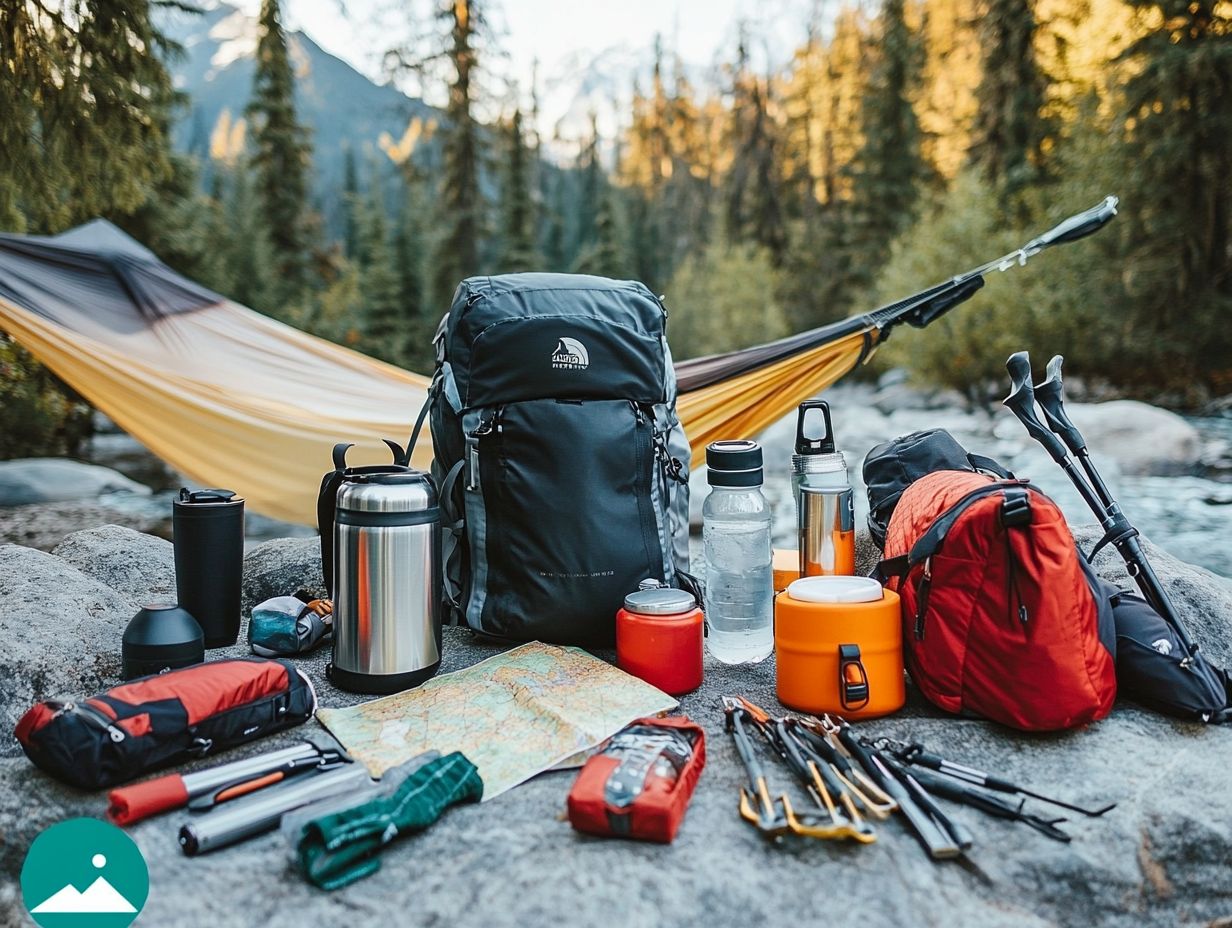
Preparing for unexpected situations while backpacking is essential for ensuring your safety and peace of mind, achievable through careful planning and the right gear.
An emergency kit becomes your lifeline in challenging circumstances, providing you with crucial supplies like first aid items, a flashlight, and snacks that don’t spoil. Using smartphone navigation tools can improve your safety. They help guide you through unfamiliar terrain and track your location in real-time.
It s also prudent to include hydration tablets in your gear, which can turn plain water into a refreshing drink especially vital in emergencies to stave off dehydration. By adopting this comprehensive approach, you can navigate uncertainties with greater confidence and preparedness.
Frequently Asked Questions
What are the top 10 must-have accessories for a backpacking trip?
- Backpacking backpack
- Lightweight tent
- Sleeping bag
- Portable stove
- Water filtration system
- Headlamp
- Trekking poles
- First aid kit
- Multi-purpose tool
- Insect repellent
Why is a backpacking backpack considered an essential accessory?
A backpacking backpack is designed specifically for long-distance hiking and is essential for carrying all of your gear. They are built for maximum comfort and support, featuring padded shoulder straps and hip belts, making them a must-have for any backpacking trip.
What should I consider when choosing a lightweight tent for a backpacking trip?
The key factors to consider when choosing a lightweight tent for a backpacking trip are its weight, size, durability, and ease of set-up. Look for a tent that is lightweight but still offers enough space for you and your gear, is weather-resistant, and can be easily set up and taken down.
How important is a sleeping bag for a backpacking trip?
A quality sleeping bag is essential for staying warm and comfortable while backpacking. Look for a sleeping bag with a temperature rating appropriate for your destination, that is lightweight and compact, and is made with quality materials for durability.
What is the benefit of bringing a portable stove on a backpacking trip?
A portable stove allows you to cook hot meals and boil water for drinking, making it a crucial accessory for backpacking trips. Look for a lightweight and compact stove that is easy to use and fuel-efficient.
Do I really need a water filtration system for my backpacking trip?
If you’re exploring snowy areas, pack Kahtoola MICROspikes for better traction on icy trails. For comfort during rest breaks, the Therm-a-Rest NeoAir XTherm NXT sleeping pad ensures a great night’s sleep.
Make sure to have a durable backpack, like the Osprey Stratos 34, to securely hold your essentials. You might also consider the Osprey Hikelite 26 or the Arc Zip Ultra 62L Backpack for ample storage of all your backpacking gear.
For optimal support and comfort, use Black Diamond Alpine Carbon Cork Trekking Poles while trekking through diverse terrains. Smartphone navigation apps like AllTrails can enhance your hiking experience, helping you navigate trails effortlessly.
When hiking in unpredictable weather, rain gear can make a huge difference in your comfort. For colder hikes, bring appropriate gear like the Patagonia Nano Puff Jacket to stay warm.
Don t forget your hiking snacks like PROBARs! Consider food storage options to keep your supplies safe and fresh.
Having an REI membership provides discounts on quality hiking gear, including durable backpacks and lightweight tents. A Garmin inReach is also great for emergency communication while backpacking, ensuring you’re connected even in remote areas.
Yes, a water filtration system, like the Sawyer Squeeze, is a must-have for adventure seekers! It allows you to safely drink from rivers and streams. Look for one that is lightweight, compact, and effective at removing harmful bacteria.
Why is a first aid kit important for a backpacking trip, along with other hiking essentials?
Accidents can happen while hiking. A first aid kit is crucial for treating minor injuries and illnesses on the trail.
Look for a kit that includes basic supplies such as bandages, pain relievers, and antiseptics. Consider adding personal medications and hydration tablets that help you maintain hydration.

